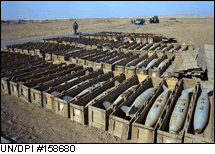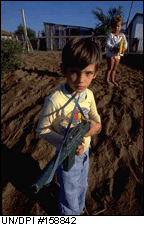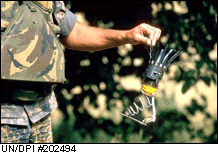|
|
The Brandt Proposals: A Report Card
Armaments and Security
 |
|
The Brandt Reports pointed to the huge waste of resources involved in military spending for armaments. North-South called for the conversion of arms production into civilian production, a strengthening of UN peacekeeping forces, a reduction of arms exports, and a stiff tax on arms trade – fees which could be channeled into resources for international development.
|
| |
The Brandt Commission also proposed greater disclosure of arms exports, so that the international community can see who is making, selling, and buying the world's weapons.
In addition, the Brandt Commission put forward a new concept of security. A member of the Brandt Commission, former Swedish Prime Minister Olof Palme, also chaired the Independent Commission on Disarmament and Security Issues. In its 1982 report, Common Security, the Palme Commission suggested that the military-based notion of security be transformed through greater international cooperation, transparency, disarmament, conversion, and demilitarization. Said Brandt,
"All we can do is add our plea to theirs: that genuine disarmament be pursued, as the first priority of international action, to rid the world both of the growing insecurity of the proliferation of weapons, and of their unacceptable costs, which now pose a serious threat to several industrialized and developing economies" (CC, 38).
Major breakthroughs toward disarmament have been made in the Non-Proliferation Treaty (1968), the Anti-Ballistic Missile Treaty (1972), and the Strategic Arms Reduction Treaties (1991 and 1993). The Comprehensive Test Ban Treaty for nuclear weapons and the Biological and Chemical Weapons Conventions are still being negotiated and much progress has been made. Ultimately, international peace must be generated at the international level. A broad and humane concept of global security has many believers, but no overarching plan is close to being endorsed and put into action by a majority of nations. |
| |
| Security is still defined as the sovereign right of a government to guard against external threats. Self-defense may be a legitimate national privilege, but it has often led to unfortunate internal consequences when governments use the claim of 'national security' as a pretext to destabilize or suppress their own populations. As the Brandt Reports stressed, security must be reconceived with people foremost in mind. The purely defensive concept of security should be enlarged to include hunger, disease, poverty, environmental stress, repression, and terrorism, all of which endanger human security as much as any military provocation. |
|
 |
|
|
To that end, the international community has the responsibility to eliminate any social conditions that pose threats to the protection and dignity of people, before they erupt into armed conflict.
Instead of cultivating peace through the promotion of benign trade and new social and economic infrastructure, the manufacture and sale of armaments has caused widespread instability and undermined development across the planet. In the years since the Second World War, 95% of the arms trade has originated in developed nations, which favor the employment and manufacturing base that the armaments industry provides, and use weapons sales to further their foreign policy objectives toward the maintenance of regional balances. During the same period – nearly half-a-century – 98% of the world's wars have been fought in the developing world, where increasing militarization has led to poverty, despair, and social chaos, draining resources away from peaceful, productive, and life-enhancing endeavors.
The Brandt Commission noted that many developing nations spend money on arms more out of fear than for real security needs. In addition, every weapons culture undermines the economic base that helps support it. Brandt observed, "As massive arms imports require an adequate infrastructure, absorb scarce skilled labor, and additional foreign exchange for maintenance imports, this all increases debt burdens" (N-S, 121-22). |
| |

|
|
"If only a fraction of the money, manpower, and research presently devoted to military uses were diverted to development, the future prospects of the Third World would look entirely different" (N-S, 117).
"There is no doubt in my mind: only an end to the arms race, which in developing countries also has reached a terrifying pace, will give us the chance of overcoming our common crises – the grim political and economic confusion engulfing our societies everywhere" (CC, 8). |
| |
|
In 1980, world military expenditures, fueled by tensions between the United States and Soviet Union, were nearly $450 billion per year. Today, long after the Cold War's end, the world is spending $800 billion annually on weapons. By way of comparison, the cost of a comprehensive program to meet the food, water, sanitation, health, and educational needs of the entire developing world would be about $80 billion per year, according to World Bank figures.
Said Brandt,
"The problem is to reduce the demand for weapons so that resources can be captured before they become armaments. But we make no simplistic assumption that what could be saved by limiting military expenditure could easily be diverted into development assistance. New economic and political priorities are also required" (N-S, 123).
Many believe that the world lost a vital opportunity for demilitarization as the Cold War ended in the early 1990s. Industry, resources, capital, research, and manpower could have been retooled from arms production into the production of equipment and technology essential for ending hunger and poverty, and putting poor nations back on the road to development.
Proposals for the conversion of weapons into peacetime manufactures, and weapons budgets into peace dividends, were short-lived. |
| |
|
As world trade boomed, so did inter-governmental and covert trade in armaments. Flexible military-industrial policies in the 90s made it far easier to import conventional weapons than in the 80s. As the new century begins, military spending continues to impose major burdens on every nation's economy, diverting potential resources from development. At its present rate of growth, annual world military spending will surpass $1 trillion in a few years. |
|
 |
| |
| In every society that chooses militarization over development, there are cultural side effects: crime, drug abuse, urban conflict, corruption, fundamentalism, ethnic tension, and intermittent violence. The world is a dangerous place, not inherently so, but because nations have not had the collective will to coordinate its protection. Ultimately, the international community must have a say in the expenditure, production, and trade of armaments, especially in regions of conflict and tension.
Only collective security can ensure national security and bring about the climate necessary for economic development. At the same time, military action using conventional weapons can only be justified in situations of genuine national defense or under the banner of the United Nations. Weapons of mass destruction – nuclear, chemical, and biological – must never be used in a country's self-defense, and should be eliminated from the world as soon as possible. Nations are obviously short of these goals, and all suffer for want of lasting peace. |
| |
| GRADE: F |
|
|
|
|
|
|
|
|
|

